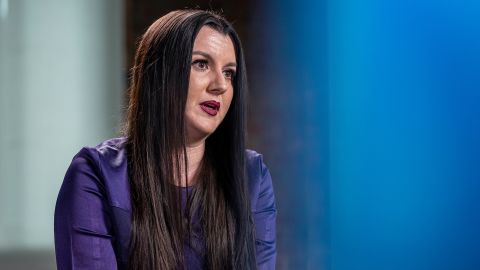CNN
—
Instacart wants to help grocery stores get in on the ultra-fast delivery craze.
The on-demand grocery delivery company on Wednesday announced several new services for retail partners, including one called Carrot Warehouses, which promises to help grocers build out the infrastructure to support 15-minute deliveries. That would cut Instacart’s quickest existing option — 30-minute deliveries — in half.
In an interview with CNN Business this week, Instacart CEO Fidji Simo said the details may differ depending on the retailer but “the standard model” for the new service will entail Instacart leasing small warehouse facilities and handling “a lot of the labor and technology.” The retailers will supply the goods and be in charge of inventory and supply chain management.
“They would basically leverage all the things they’re extremely good at,” said Simo. “That being said, the thing that is interesting about our model … is we adapt to whatever they want based on their needs.”
Instacart said it has struck a partnership with supermarket chain Publix to offer 15-minute deliveries in Atlanta and Miami in the “coming months.” Simo declined to talk specifics on how the Publix partnership will be set up.
The new service comes at a potential inflection point for both Instacart and the ultra-fast delivery market.
Instacart, a decade-old privately-held company, was one of the great beneficiaries of the pandemic boon for online deliveries. Its valuation doubled twice during the pandemic to $39 billion and its shopper workforce, who are largely treated as independent contractors, also more than doubled to 600,000 people. But as CNN Business reported last month, the incredible demand has since begun to stabilize.
Meanwhile, a number of startups have been fiercely competing to deliver goods to consumers as quickly as possible by owning the inventory stocked in their micro-fulfillment stores and delivered by their own employees. The premise has begun to draw scrutiny, both over potential safety issues as well as the sustainability of such services. Earlier this month, two such startups operating in New York City abruptly shut down their companies after running out of money. (Another company announced a $768 million fundraise last week, catapulting its valuation to nearly $12 billion.)
Simo, who was poached last summer from Facebook, where she served as VP and head of the company’s flagship app, said ultra-fast delivery startups are “spending big” to essentially “eat retailers’ lunch.” But she said Instacart’s approach is different: It wants to help existing retailers build out the capability for themselves, leveraging their existing inventories.
Unlike some newer services, which focus primarily on 15-minute deliveries, Instacart also serves a wider range of needs, from two-hour shipments to monthly deliveries, according to Simo.
“They’re focused on just one very specific segment of the market, which is all the things you need in 15 minutes. This is a substantial segment … but that’s certainly not the whole market,” Simo said.
Instacart isn’t the only on-demand delivery company looking to attract customers by adding an ultra-fast delivery option. Grubhub announced a partnership last month with ultra-fast delivery startup Buyk, but Buyk shut down and filed for bankruptcy shortly after. In December, DoorDash announced a 10-to-15 minute delivery service in New York City. And Uber announced a partnership last May with GoPuff, the $15 billion startup that offers 30-minute deliveries of essential goods in more than 1,000 cities.
Carrot Warehouses is one of three new offerings that Instacart unveiled Wednesday as part of what it’s calling InstacartPlatform. In addition to ultra-fast delivery, Instacart is opening up advertising solutions and data insights to retail partners in a bid to help with “all aspects of what it takes for grocers to execute a true digital transformation.”
“We do see ourselves as the antidote to Amazon for grocers,” noted Simo.
Five years ago, Amazon bought Whole Foods in a move that industry onlookers suspected could be a death blow for Instacart. The high-end grocer was once the delivery startup’s biggest retail partner. But Instacart continues to make clear that it intends to compete.
By pushing to broaden its portfolio of services for partners and adapt to expectations for ever faster deliveries, Instacart may also be looking to better position itself for a public market debut.
Asked about its IPO plans, Simo declined to comment on timing but said: “We do plan to be a public company at some point and I really wanted to make sure that, as we think about that, we really attract investors that understand the vision for the company.”

